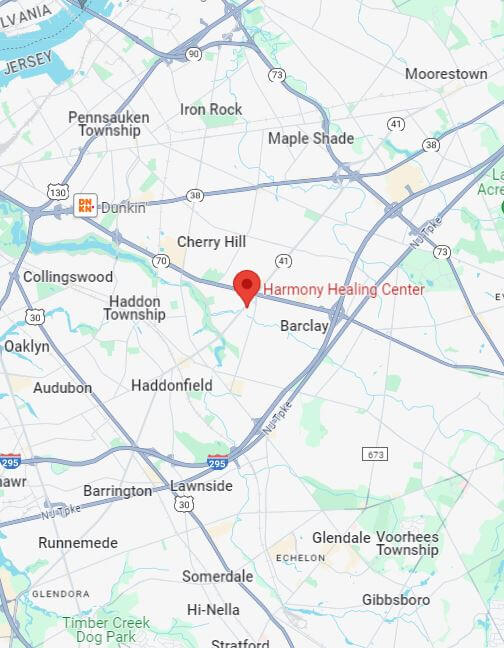Harmony Healing Treatment Center, located in Cherry Hill, New Jersey, specializes in the rehabilitation and treatment of morphine addiction. Our addiction treatment team is committed to giving personalized care to our patients so they can overcome their dependence on morphine and regain control of their lives.
At Harmony Healing Drug and Alcohol Addiction Treatment Center, we offer a wide range of treatment programs designed to address morphine addiction comprehensively. Our services include medical detox, intensive outpatient programs (IOP), partial hospitalization programs (PHP), and general outpatient services. To cover the cost of these programs, we accept insurance to make our morphine addiction treatment programs accessible to those in need. Contact us to learn more about the addiction treatment services we offer for morphine addiction treatment.
What Is Morphine Addiction?
Morphine addiction stems from the chronic use of morphine, a narcotic that is part of a group of drugs known as opioid analgesics, sold under brand names such as MS Contin, Kadian, and Roxanol for intravenous pain relief or in a pill form.
Morphine is prescribed for severe pain management, such as post-surgery or cancer pain therapy. While Morphine is a powerful pain reliever, it also has a high potential for abuse and dependency. The addictive nature of morphine stems from its ability to cause euphoria, which can lead patients to misuse the drug. Over time, the body builds a tolerance to morphine, which is the most common morphine addiction symptom. This increased tolerance requires increased doses to gain the same effects, which results in both physical and psychological dependence.
Those addicted to morphine may find it challenging to stop using morphine despite the negative impact it has on their health, relationships, and daily life. Treatment for morphine addiction typically involves a combination of medical detox, behavioral therapy, and support programs to help individuals achieve and maintain sobriety.
Can You Get Addicted to Morphine?
Yes, morphine is highly addictive. However, not everyone who uses opioids like morphine gets addicted. According to Johns Hopkins Medicine, researchers are unsure about why this is. Morphine can create feelings of euphoria, and some think that those who experience these pleasurable feelings are more likely to get addicted.
As individuals use more morphine to achieve the desired euphoria, this results in an increase in tolerance and an increased need for higher doses to achieve the same effect. The addictive nature of Morphine stems from its action on the brain’s opioid receptors, altering pain perception and inducing pleasure. Over time, this results in physical and psychological dependence, making it very difficult to quit even though there are adverse consequences.
Signs of morphine addiction are a compulsive desire for the drug, a higher tolerance for the drug, and a desperate need to obtain the drug. This addiction can significantly impact a person’s health, relationships, and overall quality of life. Professional treatment, including medical detox and behavioral therapy, is often necessary to overcome morphine addiction and achieve long-term recovery.
How Addictive Is Morphine?
Morphine is considered highly addictive and is often used as a benchmark to compare the addictive potential of other opioids. To get a better idea of how addictive morphine is, here’s a comparison of morphine’s addiction potential relative to other commonly abused opioids:
- Heroin: Heroin is chemically made up similar to morphine but is considered more addictive due to its rapid onset and intense euphoric effects. However, studies indicate no significant difference in preference between morphine and heroin among users, highlighting similar addiction potential.
- Fentanyl: Fentanyl is far more potent than morphine — about 50 to 100 times stronger. Its high potency and ability to quickly cross the blood-brain barrier make it particularly addictive and deadly.
- Oxycodone: Oxycodone is roughly 1.5 times stronger than morphine and is also highly addictive, frequently abused for its euphoric effects.
- Hydrocodone: Equal in strength to morphine, hydrocodone is one of the most widely abused medicines in the United States, often found in combination with acetaminophen (e.g., Vicodin).
- Codeine: Codeine is significantly less potent than morphine (about 7 to 14 times weaker) and is typically used for mild and moderate pain and cough suppression.
The addiction potential of opioids can vary based on their pharmacological properties, such as potency, speed of action, and the intensity of euphoria they produce.
Why Is Morphine Addictive?
Morphine is addictive due to its powerful effects on the brain’s reward system. When morphine is administered, it binds to and activates receptors in the brain. This blocks the transmission of pain and releases large amounts of dopamine, a neurotransmitter that is associated with pleasure, creating a sense of euphoria.
This euphoric effect can lead to repeated use and, eventually, addiction. Here are some key mechanisms that play a role in morphine’s addictive nature:
- Activation of Mu-Opioid Receptors: Morphine binds to mu-opioid receptors in the brain and other tissues. This binding blocks pain signals and triggers dopamine release, leading to euphoria and pain relief.
- Dopamine Release: The increased release of dopamine in the brain’s reward pathways reinforces the behavior of taking the drug, as the brain associates morphine use with pleasure.
- Increase in Tolerance: Over time, repeated use of morphine leads to tolerance, where higher doses are needed to achieve the same effects.
Common Brand Names of Morphine
Morphine is available under various brand names and is prescribed for severe pain management. These formulations may vary in their release mechanisms, but they all contain morphine as the active ingredient. Below you will find some of the most prescribed morphine brands.
Morphine brand names
Contact Us for a Free Assessment
Are you ready to turn the page and begin a new chapter in your story? We have the tools you need to transform your life. Let’s talk about what’s next.

What Is a Morphine Addiction Rehab Facility?
A morphine addiction rehab facility is a specialized treatment center that helps individuals overcome dependence on morphine. These facilities offer a structured environment where patients receive medical care, counseling, and support to manage withdrawal and treat the underlying causes of their addiction.
Rehab facilities for morphine addiction provide many services, including medical detoxification, cognitive behavioral therapy, individual and group therapy, and comprehensive aftercare planning. The goal is to help patients achieve sobriety through personalized treatment plans. These facilities play a crucial role in recovery by offering a supportive and therapeutic environment.

Harmony Health Center – Cherry Hill, New Jersey
401 Kings Highway South
Building #1 Tara Corporate Park
Cherry Hill, NJ 08034
Morphine Addiction Rehab Center in New Jersey
Harmony Healing Substance Addiction Treatment Center, located at 401 Kings Highway S, Cherry Hill, New Jersey 08034, offers comprehensive treatment options for morphine addiction tailored to meet a variety of recovery needs and goals. Each program is designed to provide personalized care and support to help patients achieve recovery.
Our services include:
Partial hospitalization programs (PHP) with housing
Intensive outpatient programs (IOP)
Medication-assisted treatment (MAT)
General outpatient services
How to Find a Morphine Abuse Treatment Facility Near Me
Finding a suitable morphine abuse treatment facility involves several steps to ensure you obtain the best care for your needs. Here are some recommended steps to take to find the right morphine abuse treatment center that will be right for you.
Steps to find a treatment facility
Does Health Insurance Cover Morphine Drug Rehab Treatment?
Health insurance coverage for morphine drug rehab treatment varies depending on the patient’s insurance plan. Many insurance plans provide coverage for addiction treatment, including morphine addiction rehab, as part of their mental health or addiction benefits. However, coverage specifics such as deductibles, copayments, and the extent of coverage often differ between insurance companies and individual plans.
Patients should review their insurance policy or contact their provider to understand the details of their coverage for Morphine drug rehab treatment. Some plans may fully cover treatment, while others require copayments or have limitations or exclusions on the duration or type of treatment covered. Additionally, patients may need to seek treatment at facilities within their insurance network to maximize coverage and minimize out-of-pocket expenses.
How Much Is Morphine Rehab Without Health Insurance?
Without health insurance, the cost of morphine rehab varies widely based on factors such as facility type, treatment duration, and level of care. Outpatient programs range from $1,000 to $10,000 for three months, while inpatient rehab can cost $6,000 to $30,000 for a 30-day stay. Luxury or specialized facilities may come with higher costs.
Patients seeking morphine rehab without health insurance may explore various options to manage costs, such as sliding scale fees, payment plans, or scholarships offered by some treatment centers. Additionally, many facilities offer financial assistance or can help patients find alternative funding sources to make treatment more affordable. Patients need to inquire about pricing and available financial assistance options when considering morphine rehab without health insurance.
Type of Morphine Addiction Treatment Programs Available
Morphine addiction treatment programs include diverse options to address individuals’ needs. Some options include medical detoxification for safe withdrawal, inpatient rehabilitation providing intensive therapy in a residential setting, outpatient programs for flexible treatment, and medication-assisted treatment combining medications with therapy to manage cravings and withdrawal symptoms effectively.
Morphine Addiction Therapy and Counseling
Inpatient and Residential Morphine Rehabilitation
Medication-Assisted Treatment (MAT) Morphine Rehab
Morphine Outpatient and Intensive Outpatient Programs

How Long Is a Morphine Rehab Program?
The duration of a rehab program for morphine depends on the level of the patient’s addiction. Inpatient programs range from 28 days to several months, offering intensive, round-the-clock care for severe addiction cases. Outpatient programs range from several weeks to several months, providing flexibility for patients with milder addiction by maintaining their daily responsibilities.
The length of treatment is determined by many factors, including the patient’s response to treatment, progress in recovery, level of support at home, and any co-occurring disorders.
Some patients may benefit from extended treatment to ensure sustained recovery and learn essential skills for relapse prevention, while others may progress quicker through shorter programs. Tailoring the duration of rehab to the patient’s needs increases the likelihood of successful recovery outcomes. Contact us at Harmony Healing Center in Cherry Hill, NJ, to learn more about the treatment programs we offer for morphine rehab.
Free Morphine Drug Addiction Testing and Assessment in New Jersey
Harmony Healing Center in New Jersey offers morphine drug addiction testing through a free assessment for patients as part of the admissions process. Our professional team conducts comprehensive assessments to evaluate the extent of addiction and determine the most appropriate treatment plan for each patient.
During the assessment, patients undergo physical exams, substance abuse evaluations, and psychological screenings to identify any underlying issues contributing to addiction. This service is free to ensure patients receive the support they need to start their recovery journey effectively. Contact Harmony Healing Center at (888) 409-5356 to schedule your free morphine addiction testing and assessment.
How to Get into Drug Rehab for Morphine Addiction Treatment
Getting into drug rehab for morphine addiction treatment starts with reaching out to treatment centers like Harmony Healing Center in New Jersey. Patients can call our admissions team to schedule a free assessment to determine the level of care needed based on the severity of their addiction and needs. Following assessment, patients can discuss treatment options.
Once the appropriate treatment plan is determined, patients can complete the admissions process, which typically involves providing personal information, insurance details (if applicable), and medical history. Harmony Healing Center offers support throughout this process to ensure patients receive the necessary rehab care and support to begin their journey toward recovery from morphine addiction.
Related Prescription Drug Treatment Programs at Harmony Healing
Statistics Related to Morphine Addiction in New Jersey and the United States
Opioids contribute to a minimum of 72% of overdose deaths annually in the United States, according to data from the National Center for Drug Abuse Statistics (NCDAS). In New Jersey, prescriptions are written for enough opioids to cover 38.9% of the residents, and 89.1% of overdose deaths in the state are opioid-related.
Prescription drug addiction remains a pressing concern in New Jersey, mirroring trends seen across the entire nation. Opioid prescriptions, in particular, raise significant alarm, as indicated by troubling information from the New Jersey Department of Law and Public Safety. The fact that the state issued a staggering 3,164,446 opioid prescriptions in 2023 underscores the severity of the problem.
Data from the 2022 New Jersey Substance Use Overview reveals that 45,914 individuals sought rehab treatment. Essex County had the highest admission rate, with 8,194 people accounting for 10% of the total, while Hunterdon County had the lowest, with 731 admissions, representing 1%.
The data highlights the profound challenges of opioid addiction in New Jersey and the United States. Yet, the substantial number seeking rehab underscores hope for recovery. Despite regional differences, each person entering treatment signifies progress. It emphasizes the need for expanded access, support, and preventive measures to combat addiction and save lives.
Contact Harmony Healing Center
Get personalized help from an empathetic professional.
For Your Free Assessment Call:
